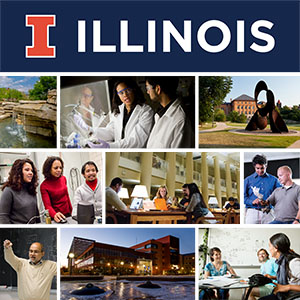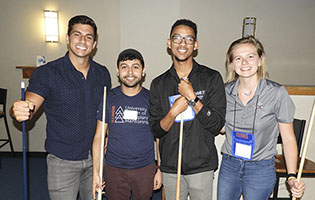Associate Dean for Graduate, Professional and Online Programs
 Between 2016 and 2021, I served as Associate Dean for Graduate, Professional and Online Programs in The Grainger College of Engineering. During my term, graduate engineering enrollment increased from around 3,700 students in Fall 2016 to more than 4,800 in Fall 2020, distributed across multiple research- and profesionally-oriented degree programs and with around 1,300 students in online, distance-learning programs. Such dramatic growth required careful attention to scalable policies and procedures, as well as to resource allocation for critical functions, including academic and career advising, technology innovation, communication and recruitment, and professional development programming.
Between 2016 and 2021, I served as Associate Dean for Graduate, Professional and Online Programs in The Grainger College of Engineering. During my term, graduate engineering enrollment increased from around 3,700 students in Fall 2016 to more than 4,800 in Fall 2020, distributed across multiple research- and profesionally-oriented degree programs and with around 1,300 students in online, distance-learning programs. Such dramatic growth required careful attention to scalable policies and procedures, as well as to resource allocation for critical functions, including academic and career advising, technology innovation, communication and recruitment, and professional development programming.
As a core member of the Dean's leadership team, it was my responsibility to articulate strategic leadership, develop revenue and enrollment projections, and implement critical academic initiatives across all areas of graduate and professional education. These areas included:
- expansion of PhD enrollment and related research infrastructure,
- growth in (number of and enrollment in) professionally oriented master’s programs,
- growth in (impact of and enrollment in) online programs for distance-learners,
- expanded use of online learning options for on-campus students,
- investments for increased participation from traditionally underrepresented groups,
- launch of not-for-credit professional and executive training programs,
- development of international partnerships,
- development of faculty compensation policies for online instruction, and
- analysis and promotion of quantitative and reputational rankings.
The Office of Graduate, Professional and Online Programs included 15 academic professional and administrative staff members. Together, we adhered to core values that reflected who we aspired to be and what we wanted our students and graduates to represent. We treated all students enrolled in our courses and degree programs as members of the college community without distinction. We did not compromise with their success, as it was our success. To this end, we dedicated available resources in accordance with students’ circumstances and needs in order to enable them to attain their educational objectives and contribute to the strong reputation of the college throughout their professional lives. We recognized that educational objectives may differ between different academic programs and that it was our responsibility to provide instructional and other services accordingly. We invested intellectually, financially, and reputationally.
Together with Diana Gonzalez, then Associate Director for Graduate Program Success, and, before her, with Rhonda McElroy, then Grainger Engineering Executive Director for Graduate Programs, I oversaw the Mavis Future Faculty Fellows Academy, a year-long professional-development program and formal course for senior PhD students aiming to pursue academic careers. In this program, participants obtained training in research management, teaching pedagogy, and mentoring principles, as well as the preparation of competitive applications for faculty positions. They also received a $2,000 scholarship intended to support participation in career-enhancing professional activities. Under my leadership, enrollment in the Mavis program increased from 23 students in AY 2016/17 to 46 students in AY 2020/21.
Between 2017 and 2019, Rhonda McElroy and I also ran the Road Map to Graduate School 8-week course for some 30 junior and senior engineering undergraduate students interested in applying to graduate school. Students in this course learned how to choose a degree program that fit their needs and how to prepare a competitive application. As with the Mavis Future Faculty Fellows Academy, Road Map to Graduate School consisted of a series of seminars with invited speakers, panel sessions, and in-class exercises to complement out-of-class assignments.
Together with Frank Hoskinson, Grainger Engineering Executive Director for Online Programs and Initiatives, I oversaw a blended-learning initiative intended to increase access to online delivery modalities of course content for on-campus students. Enrollments in on-campus/online course sections increased from 157 in AY 2017/18 to 407 in AY 2018/19. Through a combination of edited and live-recorded video content, advanced use of learning management systems and online conferencing, and careful monitoring of student progress, this initiative grew multifold as graduate and undergraduate students took advantage of semester-long, off-campus internships and the opportunity to overcome class schedule conflicts, and as the COVID-19 pandemic prompted a rapid conversion to remote and hybrid learning environments.
Professional and Executive Training and Education
In Fall 2017, under my initiative and leadership, the college launched the Center for Professional and Executive Training and Education using centralized seed funding in order to capture growth in high-demand, professionally-oriented graduate degree programs; provide career-specific training in technology innovation, management, and entrepreneurship; engage with industry partners for graduate-level internships and capstone projects; and coordinate development and delivery of training programs and workshops aimed at industry professionals. This initiative took a deliberate and holistic approach to programming, staffing, and budgeting in order to provide a unique, career-enhancing experience for our graduates, and sustain our reputation as a high-impact land-grant institution.
 During my tenure, several new professionally-oriented master's degree programs, integrating technical expertise with industry-relevent competence, were developed and approved for launch. These included a Master of Engineering in Railway Engineering delivered in collaboration with the railway program at KTH Royal Institute of Technology in Stockholm, Sweden, as well as Master of Engineering programs in Plasma Engineering, Aerospace Systems Engineering, and Autonomy and Robotics. Additional degree programs aimed at working professionals also became available online, including the Advanced Analytics concentration in the non-thesis Master of Science in Industrial Engineering.
During my tenure, several new professionally-oriented master's degree programs, integrating technical expertise with industry-relevent competence, were developed and approved for launch. These included a Master of Engineering in Railway Engineering delivered in collaboration with the railway program at KTH Royal Institute of Technology in Stockholm, Sweden, as well as Master of Engineering programs in Plasma Engineering, Aerospace Systems Engineering, and Autonomy and Robotics. Additional degree programs aimed at working professionals also became available online, including the Advanced Analytics concentration in the non-thesis Master of Science in Industrial Engineering.
Growth in professionally-oriented degree options was accompanied by increased attention on professional development programming, including industry networking events, seminar series with industry speakers, and optional coursework in entrepreneurship and innovation. Partnership with Gies College of Business also provided some opportunities for engineering students to supplement their degree with credit from the iMBA specialization in Value Chain Management.
Together with Keri Carter Pipkins, then Associate Director for Professional Education and Workforce Development, I developed a program for continuing education and credentialing through short courses and customized programs on topics of high demand, targeted to the needs of particular industry sectors or partners. Keri and I interacted closely with Brooke Elliott (and previously with Carlos Torelli) and Amanda Brantner with Professional and Executive Education at the Gies College of Business in order to articulate effective business models for such new ways for the university to partner with external customers, delivering unique content and/or value in a space complementary to the traditional for-credit space.
A Culture of Diversity and Inclusivity
 It was my professional commitment to work toward an inclusive environment throughout The Grainger College of Engineering that reflected the diversity of the nation and broadened access to the opportunities and benefits of our programs. From the diversity of the students, faculty, staff, and alumni grows a community that is better and with impact both broader and more meaningful.
It was my professional commitment to work toward an inclusive environment throughout The Grainger College of Engineering that reflected the diversity of the nation and broadened access to the opportunities and benefits of our programs. From the diversity of the students, faculty, staff, and alumni grows a community that is better and with impact both broader and more meaningful.
The annual MERGE (Multicultural Engineering Recruitment for Graduate Education) event aimed to increase applications from domestic students from traditionally underrepresented groups. The event, organized by staff from the Office of Graduate, Professional and Online Programs, invited prospective students from across the nation to an all-expenses paid visit to campus early in the fall before applications were due. Presentations by faculty, staff, and current students introduced attendees to the unique demands of graduate school and the importance of carefully developed mentoring relationships throughout one's graduate studies. They also highlighted important elements of successful applications to engineering graduate programs and reviewed various opportunities for funding a PhD, including both internal and external fellowships. MERGE participants visited with their designated home department and socialized with current student ambassadors. Under my leadership, the MERGE program expanded in AY 2018/19 to an optional third day to allow participants to attend classes of interest and schedule additional visits with potential faculty advisors.
Read this web story about the MERGE program
The Support for Underrepresented Groups in Engineering (SURGE) Fellowship program was managed by staff from the Office of Graduate, Professional and Online Programs. Some 330 SURGE Fellows had participated in the program since its inception in 1992. Fellows received a one-year $25,000 fellowship and a $4,000 supplemental fellowship in years two through five on top of full-time tuition-waiver-generating assistantships. Under my leadership, the annual number of awards increased from 12 in AY 2017/18 to 18 in AY 2018/19.
15 graduate programs (including Chemical and Biomolecular Engineering) in the Grainger College of Engineering partnered with the Sloan University Center for Exemplary Mentoring at Illinois, a fellowship and professional development program for US PhD students who are African American, Latina/Latino, and/or American Indian/Alaskan Native. I served on the Sloan UCEM Steering Committee and Scholarship Board and successfully advocated for an expansion of membership and provisional award selection for MS students in programs without direct-to-PhD options. In 2017 and 2018, I also had the privilege to attend the Institute on Teaching and Mentoring in Atlanta, GA, and Arlington, VA, respectively, as a representative of the Sloan UCEM at Illinois and as a faculty and postdoc recruiter staffing a table in the career fair.
Read this web story about the Sloan Foundation grant funding the UCEM at Illinois.

